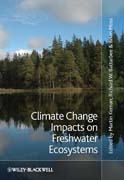
Climate change is occurring and there is little doubt now that human activityis the principal cause. However, the full extent of the impact of climate change on freshwater ecosystems is difficult to detect as other pressures on our freshwaters, such as pollution and land-use change, are still more important. But as temperatures continue to rise and pollution pressures are reduced, climate change will become the dominant threat to our freshwaters in future. In this book we examine the impact of climate change on freshwater ecosystems, past, present and future. We consider especially the interactions between climate change and other drivers of change including hydromorphological modification, nutrient loading, acid deposition and contamination by toxic substances using evidence from palaeolimnology, time-series analysis, space-for-time substitution, laboratory and field experiments and process modelling. The book evaluatesthese processes in relation to extreme events, seasonal changes in ecosystems, trends over decadal-scale time periods, mitigation strategies and ecosystem recovery. The book is also concerned with how aspects of hydrophysical, hydrochemical and ecological change can be used as early indicators of climate change in aquatic ecosystems and it addresses the implications of future climate change for freshwater ecosystem management at the catchment scale. The book is aimed at the scientific research community, but is also accessible to Masters and senior undergraduate students. Other information: This book focuses on the key drivers of aquatic ecosystem change (land-use, nutrients, acid deposition and toxic substances) and examines their interactions with global, especially climate, change using time-series analysis, space-for-time substitution, palaeolimnology, experiments and process modelling. It considers these interactionsat three critical time-scales: (i) hours/days, concerned with changes in the magnitude and frequency of extreme events; (ii) seasons, concerned with changes in ecosystem function and life-cycle strategies of freshwater biota; and (iii) years/decades, concerned with ecological response to environmental pressure, including stress reduction and ecosystem recovery. Although the impact of climate change on freshwater systems is mediated mainly through physical and chemical processes, the book is also concerned with how hydrophysical and hydrochemical change influences ecological change and how elements of ecosystems can be used as sensitive indicators of such change. Other management aspects addressed in the book will include an assessment of how restoration strategies may need to be modified to take into account the predicted effects of future climate change, the role of catchment modelling in understanding processes of, and response to, climate change and the policy implications for management of freshwaters. The book will primarily be based on output from the European Union funded Framework VI Project, Euro-limpacs (Integrated Project to Evaluate the Impacts of Global Change on European Freshwater Ecosystems) (http://www.eurolimpacs.ucl.ac.uk/) although it will call on material derived from other work being undertaken elsewhere in Europe and across the world. Contents and Contributers: 1. Introduction 2. Aquatic ecosystem variability and climate change at different timescales 3. Direct impacts of climate change on Freshwater Ecosystems4. Climate Change and hydromorphology of rivers and lakes at catchment, site and mircohabitat levels 5. Interaction of climate change and pollutants - nutrients 6. Interaction of climate change and pollutants - nutrients 7. Interaction of climate change and pollutants - toxic substances 8. The effect of Climate Change on the distribution of freshwater organisms and its implications for ecological assessment 9. Climate change: implications for aquatic ecosystem restoration 10. Modelling Catchment Scale Responses to Climate Change 11. Tools for Better Decision Making: Bridges to Policy and Science
- ISBN: 978-1-4051-7913-3
- Editorial: Wiley-Blackwell
- Encuadernacion: Cartoné
- Páginas: 320
- Fecha Publicación: 24/09/2010
- Nº Volúmenes: 1
- Idioma: Inglés
